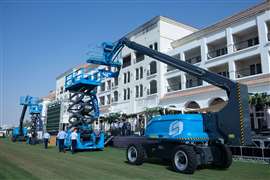Saturation point: XGMA president Chae Kyo Jeon on China's slowdown
12 November 2012

XGMA president Chae Kyo Jeon says China’s construction equipment manufacturers have to come to terms with lower sales volumes, and an end to the ‘boom’ years.
Chae Kyo Jeon is well placed to comment on the current slowdown in the Chinese construction market. Although a South Korean, he has worked in China’s construction equipment industry for more than 14 years, initially leading Daewoo in China - until it was acquired by Doosan - and then for a period as president of Terex Corp’s operations in the country. He took up his current post as president of Chinese manufacturer XGMA in 2009.
Mr Chae tells IRN that China is facing a number of problems: the government’s Yuan 4000 billion (€495 billion) stimulus programme in 2009 - initiated in response to the global financial crisis - led to enormous demand for construction equipment, demand that domestic manufacturers were happy to supply: they all invested in increased production capacity.
“All of a sudden the market was saturated”, he tells IRN, speaking at XGMA’s head office, “The population of machines is now very high – maybe 1.5 million wheeled loaders and 1 million excavators.”
XGMA - based in the prosperous southern coastal city of Xiamen, a Chinese tourist destination but also a successful port and industrial centre - was among those investing in capacity. Its facilities can produce 12000 excavators and 30000 wheeled loaders a year (many of which are the 5 t compact models popular with Chinese owner-operators). A pre-slowdown plan to boost excavator capacity to 15000 has been shelved. Although wheeled loaders and excavators are its core products XGMA also makes backhoe loaders, some skid steer loaders and concrete pumps. It is soon to enter the crane market with its first truck mounted model - a 16 t truck crane that will get its launch at Bauma China.
Now that the workload has fallen, China’s massive population of machines is working at close to 30-40% capacity, says Mr Chae. Manufacturers, XGMA included, have inventories of unsold equipment, as do their dealers. Mr Chae estimates there may be 50000 wheeled loaders and 60000 excavators sitting in Chinese yards waiting for buyers.
Equipment owners, meanwhile, unable to find work for the machines they have, are having to send machines back to dealers and manufacturers, exacerbating the inventory problem.
The fact that Chinese suppliers do not have ready-made escape routes for these machines does not help. Ritchie Bros, the auctioneer, hopes to help in this regard and plans to hold its first auction in China early in 2013. For Chinese manufacturers, still working hard to establish their brands internationally, it will be difficult to sell used machines in competition with used Korean and Japanese models, or Asian-produced machines from major US and European suppliers.
Mr Chai says all the big suppliers are now facing the same problem. Understandably, they have cut back on production. In XGMA’s case, the workforce of 5000 in Xiamen is now spending on average just 5 to 10 days a month at the factory. XGMA is 53% state-owned, and so has a particular responsibility to these workers, which means that they are getting their basic salaries paid.
According to Mr Chae, some of his competitors have not truly adjusted to the new environment and are still indulging in wishful thinking; that the Chinese government will resume spending soon, perhaps after October and the change in political leadership in China.
He is not so sure, and says the lack of a government plan is what makes the current situation so difficult. “100% of manufacturers have cash flow problems”, he tells IRN. “Next year may be 5% to 10% better than this year, but I don’t know. All of a sudden the government could announce big projects…”
In fact, the day after IRN’s interview China did just that, with a reported Yuan 1 trillion (€123 billion) to be invested in infrastructure projects around the country, particularly in railways. Although not described as a stimulus, the programme will have a positive impact.
Mr Chae, speaking to IRN after the interview, says the announcement is good news; “but the impact can't be expected in a short time. From a market standpoint, this kind of news will encourage dealers and customers to set their minds in a positive direction, and we could expect the market to turn around steadily and increase our sales step by step.”
Even so, what is clear, according to Mr Chae, is that the years of inexorable, high growth in equipment sales are unlikely to return soon.
The implications of this will go beyond China, of course. It impacts on the fortunes of the many western manufacturers who have invested heavily in China. Just as important, it could refocus Chinese attentions on export markets. Without a buoyant home market, many of these suppliers will redouble their export efforts.
Mr Chai says this is happening at his own company. XGMA has doubled its export sales so far this year, now representing around 18-20% of total sales (a figure that also reflects the reduction in domestic sales.)
If the export focus will increase, the scale of investment by Chinese manufacturers outside China will likely fall, because they have less cash. This applies also to Chinese acquisitions of western manufacturers, of which Mr Chai thinks there will be fewer in the immediate future.
In XGMA’s case, he says its export efforts were made rather later than some. It has no production facilities outside China and is still in the process of establishing dealer networks. So far a third of its export sales are in Brazil, another third in Russia – a market now dominated by Chinese wheeled loaders and where XGMA has three dealers – and with the balance in the Middle East and South East Asia.
As far as western Europe and the US are concerned, Mr Chai says they have a longer term plan to enter these markets; “We have a plan, but there are regulations. It will be step by step. Right now we are developing our dealer network in Europe - with backhoes, skid steers, compact equipment. Compact machines will be our focus.”
Engine requirements for Europe and the US are a particular challenge. Importing Stage IIIB/Tier 4i to engines to Xiamen and then re-exporting them to the west is unlikely to be economic, so he says XGMA is hoping that its Chinese suppliers will soon have engines available to meet the latest regulations.
The current strategy is to concentrate on its strengths – wheeled loaders and excavators – even if the longer term strategy is to broaden the product range, with concrete pumps and cranes being just two areas of potential.
“Right now we have to reinforce and concentrate our powers. We have to overcome this period, and after that regrow. That is my strategy”, says Mr Chae. In tandem with that is a focus on productivity and a further introduction of Japanese ‘Kanban’ and just-in-time production techniques. XGMA’s manufacturing floors, although with scarcely a worker in site during IRN’s visit in early September, certainly testify to a tidy, well-organised work flow.
“We have to improve the quality of product s, have higher value products”, he says, “Increase the sale price and secure more margin and profit.” It isn’t just XGMA pursuing that strategy; it has just become a bit more important now that China is stuttering.
BOX STORY
No rental? Think again
China has a well-developed rental market for several products, primarily mobile cranes, tower cranes and concrete pumps. Chae Kyo Jeon, XGMA’s president, says this is because these are expensive items that contractors do not always have the resources to acquire.
In contrast, Chinese earthmoving equipment is relatively inexpensive, particularly 5 t wheeled loaders and mid-sized excavators, making them easy to own. Chinese manufacturers have also helped owner-operators buy their own machines, with financing that requires no deposit.
This has led the phenomenon of the tens of thousands of owner-operators in China who ‘rent’ themselves and their machines to contractors as a package, often at a price that is related to the volume of earth moved or for the duration of a particular job.
In fact, while it is often claimed that China has no proper rental market, if you don’t quibble about definitions, you could argue that it is actually enormous, comprising tens of thousands of small owner-operators. In the case of XGMA, for example, 80% of its excavators and around 60% of its wheeled loaders are sold to this type of customer.
Stretching the definition of rental to encompass owner-operators is one thing, but there is no denying that China has very few general rental companies renting earthmoving equipment.
Does Mr Chae think that China will ever see larger scale versions of these companies? Not soon, is his response. He says the small operators are popular because their low overheads mean that they offer good prices. (The same point about owner-operators was made recently by Douglas Anderson of UK rental company GAP Group. Mr Anderson said these owners made it very difficult for large scale operated plant rental companies.)
“Also, keep in mind the culture in China”, says Mr Chae, “People are inclined to own equipment rather than rent it. Right now in China you hear people say, ‘I have five excavators. I am a rich man.’ Chinese customers are not yet used to it. It will be step by step.”
He thinks it could be 10 or 15 years before general equipment rental companies of the kind you find in Europe and North America grow in China, and it will possibly be related to increasing wealth.
“China’s GDP is number two in the world, but per capita GDP is still low”, he says, “What is it, $5000? Maybe [rental will take off] when it is over $10000.”






